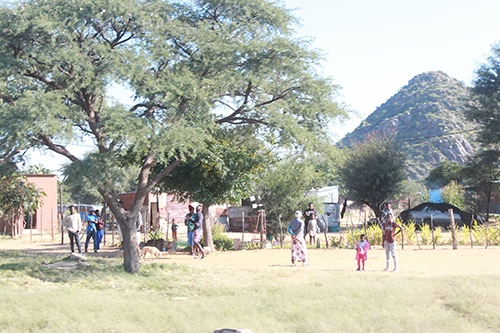Albertina Nakale
The Omaheke regional leadership has welcomed capital projects to the value of N$2.3 million which have been rolled out to the Omitara settlement.
Omitara, a sleepy settlement some 30km north of Gobabis in the Omaheke region, is rocked by a lack of access to land, drugs and alcohol abuse as well as limited employment opportunities that contribute to high poverty and crime levels in the area.
The projects include upgrading the sewer pump station by the Omaheke Regional Council at a cost of N$1.23 million.
This project, which commenced on 28 September 2021, is nearing completion, and is expected to be completed by March 2022 once the contractor has obtained and installed the sewer pumps.
Regional council spokesperson Tauno Iileka said in the past, residents experienced frequent sewer blockages due to the growing demands.
“The regional council has repaired the blockages several times, but this did not solve the problem. As a permanent solution, budgetary provisions were, therefore, made to overhaul the sewer pump system and repair the refuse trap, a system intended to collect litter and debris flushed down the sewer system,” Iileka explained.
Welcoming the new development is Okarukambe constituency councillor Rocco Nguvauva, who said yesterday that the projects came at the right time as the settlement faces a lot of socio-economic challenges.
“Omitara is facing a lot of challenges in terms of land delivery. If people want to relieve themselves, they enter private farms, and that causes a lot of conflicts. Some people got shot by farm owners when they entered these farms. The sewerage system is often blocked due to the increasing population in Omitara, and that is why residents go into private farms to relieve themselves,” he observed.
Furthermore, the lack of electrification has led to a high crime rate at the settlement.
Due to its rapid growth rate, there was also a demand to increase the capacity of electricity supply in the settlement.
The regional council, therefore, engaged Cenored to upgrade the existing transformer and construct a new low voltage supply line with street lights.
That project is expected to cost N$580 000, and is funded by the regional council and Cenored through a 50/50 cost-sharing arrangement.
The electricity expansion project commenced on 28 January 2022, and is expected to be completed by 28 April 2022.
Nguvauva believes that with the capital projects on electrification also underway, the crime rate will be reduced as the settlement will no longer be in the dark.
On job creation, he appealed to the contractors who were awarded tenders to ensure that they employ locals from the Omitara settlement to tackle high levels of unemployment amongst the young people.
“At least the majority of the workforce must come from Omitara to help alleviate unemployment and poverty, which is high at the settlement. These capital projects will also bring potential investors to Omitara,” he enthused.
Currently, there are no shopping stores in Omitara, with the exception of cuca shops.
According to Nguvauva, residents travel to Windhoek or Gobabis for their basic needs.
He then appealed to the contractors who got the tenders to complete the projects as envisaged, and to avoid shoddy work.
The regional council has also commenced with the construction of a 650m gravel road in the settlement, as well as the blading of minor roads there.
This project is funded by the Road Fund Administration, and expected to cost N$470 000.
It commenced on 31 January 2022, and is expected to be completed before the end of February 2022.
Omitara, one of the seven settlements in the Omaheke region, has a population of between 800 to 900 people, with a rapid population growth rate.
Sources of employment here include the local school, a clinic and a police station as well as commercial farms surrounding the area.
Other sources of employment and income include communal farming and small business activities.
– anakale@nepc.com.na


